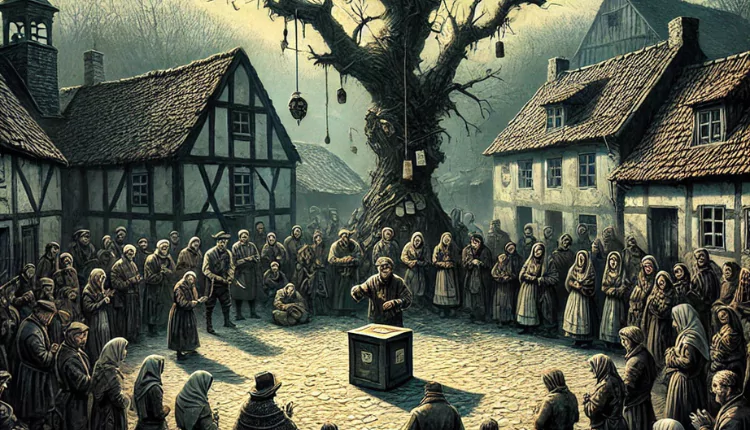On a cloudless summer morning, the town of New Hope gathered for the lottery. The dusty streets were empty of traffic, save for the occasional stray dog, and the townspeople filed quietly into the square. Men, women, and children were all present, faces calm and expectant, as though this was just another yearly ritual, like the county fair or the harvest festival. But, of course, this was something else altogether.
In the crowd, Tessie Hutchinson made her way through with her family trailing behind her. She had almost forgotten about the lottery until that very morning, busy as she’d been with the household chores. She laughed about it, joking with her friends as they teased her for being late.
Mr. Summers, the lottery’s conductor, stood on a small, makeshift platform, a black box perched beside him on an old wooden stool. The box was battered and scarred, its corners worn down from countless years of use. Though they could have replaced it, there was something about that old box that seemed to bind the town to its past, to the tradition itself.
“All right, folks,” Mr. Summers said, his voice carrying over the murmurs of the crowd. “Let’s get started.”
One by one, the heads of each household came forward to draw a slip of paper from the box. Each person clutched their folded piece, some hands steady, some visibly shaking. As he called names, Mr. Summers glanced at each face as if judging whether they held the weight of the tradition in their hearts.
The lottery had been held every year for as long as anyone could remember, yet no one could quite say when it had started or why. The old-timers whispered that it was meant to ensure the land would be fertile and the crops bountiful. Others thought it was simply something that had always been done, and that was reason enough. To question it would be to unravel a cord woven tightly into the fabric of New Hope.
When Bill Hutchinson drew his slip, he returned to his family, keeping the folded piece close to his chest. Tessie, standing beside him, looked around at her friends and neighbours with an uneasy smile. She had drawn countless times before, but there was a chill in the air this year, a silence that seemed deeper than usual. She glanced at her children, wondering if they felt it, too.
Mr. Summers called the families forward once more. This time, each member of the Hutchinson family stepped forward to draw, their fates reduced to a silent, folding piece of paper. Tessie felt a surge of fear she couldn’t explain as her fingers closed around her own slip, the paper rough against her fingertips. She forced herself to remain calm, trying to ignore the feeling rising within her.
“All right, everyone,” Mr. Summers said, glancing at each of them. “Open them up.”
There was a pause, a hesitation so strong it could be felt in the very air. One by one, the Hutchinson family unfolded their slips, eyes scanning the blank surfaces. When Tessie looked down at her own paper, she saw a small black dot.
For a moment, she couldn’t move, couldn’t speak. The dot seemed to pulse on the paper, growing larger, consuming her vision. The crowd, as if sensing her realization, shifted slightly, their eyes fixed on her, expressions hardening into something that no longer felt like familiarity.
“It’s not fair!” Tessie cried, her voice cutting through the tense silence. She looked to her friends, to her neighbours, searching for some sign of pity or mercy. “You all know it isn’t fair!”
Her words fell like stones into a well, swallowed by the weight of unbroken silence. Even her husband, Bill, stood helpless beside her, a look of resignation on his face. Though he loved her, his gaze held something far older than love—an understanding that they were bound by forces larger than themselves.
“Come on, Tessie,” Mr. Summers said, his tone carrying both pity and distance. “You know the rules.”
Around her, the crowd began to close in, the faces of her neighbours and friends growing sharper and colder, their hands empty but ready. The last rays of morning sunlight glanced off their faces, casting odd shadows that seemed to shift and blur as though her vision itself were slipping away.
Tessie’s children were shepherded back, their hands held tightly by other townsfolk, watching as their mother’s desperate protests filled the air. Her cries grew louder, insistent, breaking through the silence that held the town in its grip.
“Please!” she shouted. “This isn’t right—how can we keep doing this?”
But tradition weighed heavier than justice, and in New Hope, to defy the lottery was to defy the foundation on which the town stood. As stones were passed hand to hand, there were no words spoken. Only the sound of Tessie’s voice piercing the air one last time.
The square was empty soon after, the townsfolk dispersing back to their homes and duties, leaving no sign of the ritual that had bound them together in uneasy silence.
The black box, its job finished, was returned to its place, waiting for another year to come, another morning to dawn, and for someone else to bear the weight of the town’s tradition. And as the dust settled and silence returned, New Hope resumed its quiet, untroubled existence, its residents bound by a legacy they neither questioned nor could ever escape.
Want to revisit the golden age of storytelling where every tale had a purpose?
Delve into our collection of Classic Storybook Tales on Storyious, where each page holds a blend of nostalgia, charm, and moral insight. These timeless, classic stories feature beloved characters, rich narratives, and important lessons that continue to resonate today. From fables that shaped cultures to folk stories told for centuries, this collection revives the beauty of classic literature stories with messages that matter. Not only this, these stories are the perfect for sparking conversations or simply enjoying a thoughtful read, reminding us that good storytelling never goes out of style. So, start reading and let the old wisdom light the way.







Comments